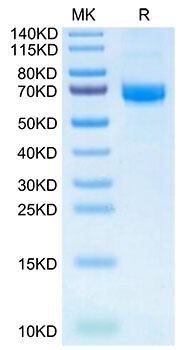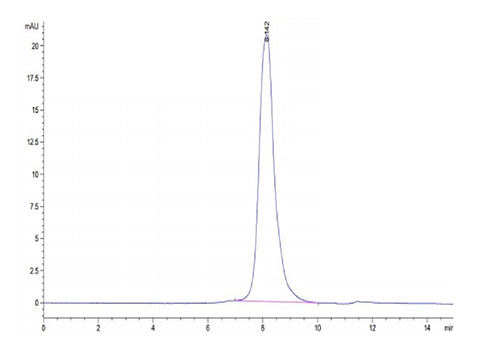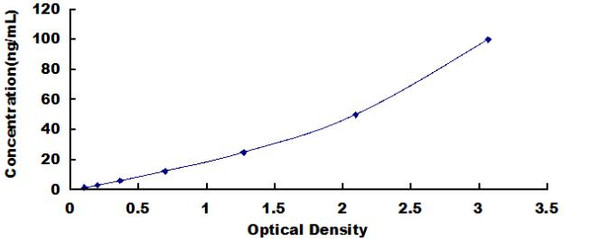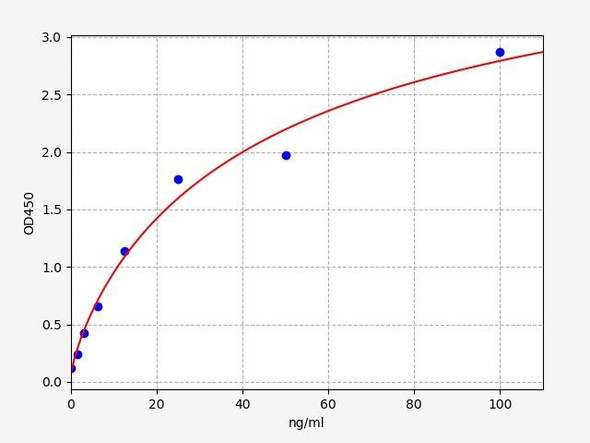Description
Recombinant Human Alkaline phosphatase (Intestinal type)/ALPI Protein
The Recombinant Human Alkaline phosphatase (Intestinal type)/ALPI Protein is a biologically active recombinant protein that plays a significant role in various cellular processes and signaling pathways in human biology. This protein is widely employed in immunological research, cell biology studies, protein-protein interaction analyses, and therapeutic development, providing researchers with a reliable tool for investigating Alkaline phosphatase (Intestinal type)/ALPI function and its implications in health and disease.
This product (SKU: RPCB1798) is produced using HEK293 cells and features a N-His&Flag tag for convenient detection and purification. The protein exhibits a calculated molecular weight of 54.5 kDa with an observed molecular weight of 63-73 kDa under denaturing conditions, achieving ≥ 95 % as determined by Tris-Bis PAGE;≥ 95 % as determined by HPLC., ensuring exceptional quality and consistency for research applications.
Key Features
| High Purity by Affinity Chromatography | |
| Mammalian & Bacterial Expression Systems | |
| High lot-to-lot consistency via strict QC |
| Product Name: | Recombinant Human Alkaline phosphatase (Intestinal type)/ALPI Protein |
| SKU: | RPCB1798 |
| Size: | 100 μg |
| Reactivity: | Human |
| Synonyms: | ALPI,Intestinal-type alkaline phosphatase, IAP, Intestinal alkaline phosphatase, |
| Tag: | N-His&Flag |
| Expression Host: | HEK293 cells |
| Calculated MW: | 54.5 kDa |
| Observed MW: | 63-73 kDa |
| Gene ID: | 248 |
| Protein Description: | High quality, high purity and low endotoxin recombinant Recombinant Human Alkaline phosphatase (Intestinal type)/ALPI Protein (RPCB1798), tested reactivity in HEK293 cells and has been validated in SDS-PAGE.100% guaranteed. |
| Endotoxin: | < 1 EU/μg of the protein by LAL method. |
| Purity: | ≥ 95 % as determined by Tris-Bis PAGE;≥ 95 % as determined by HPLC. |
| Reconstitution: | Centrifuge the tube before opening. Reconstitute to a concentration of 0.1-0.5 mg/mL in sterile distilled water. Avoid vortex or vigorously pipetting the protein. For long term storage, it is recommended to add a carrier protein or stablizer (e.g. 0.1% BSA, 5% HSA, 10% FBS or 5% Trehalose), and aliquot the reconstituted protein solution to minimize free-thaw cycles. |
| Storage: | Store at -20℃.Store the lyophilized protein at -20℃ to -80 ℃ up to 1 year from the date of receipt. After reconstitution, the protein solution is stable at -20℃ for 3 months, at 2-8℃ for up to 1 week. |
Alkaline phosphatase can be considered "our favorite enzyme" for reasons apparent to those who diagnose and treat metabolic bone diseases or who study skeletal biology. Few might know, however, that alkaline phosphatase likely represents the most frequently assayed enzyme in all of medicine. Elevated activity in the circulation is universally recognized as a marker for skeletal or hepatobiliary disease.








